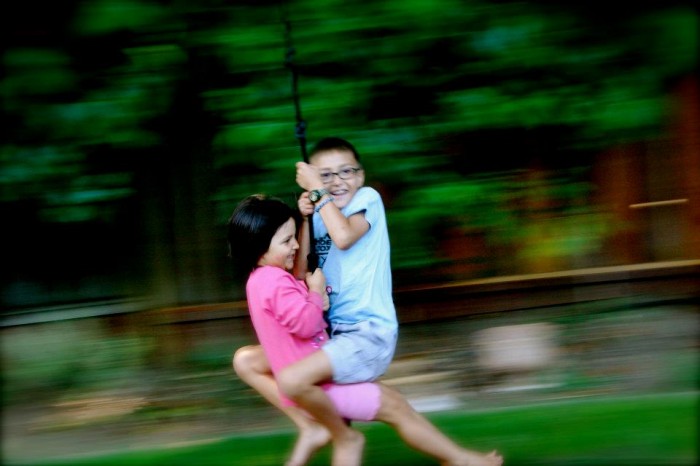Something profound and internal happens in the first year of parenting, (unless dire circumstances upend the process) that resets a new parent’s mind and priorities. We become fully dedicated to seeing that life goes well for our child, and for a widening circle of loved ones around us as we gain our footing as a family.
But sooner or later, we find ourselves rocked by emotions. Fear of losing our precious child. Disappointment in ourselves or in our children. Fear of having ones own life crowded out by the life of this little one. The emotional specters that appear are different for each parent. Handling this unexpected tide of parental fears is the biggest untold challenge of parenting.

I want to take a short opportunity to talk about some of the common fears that wash over us. Fears don’t subside just because someone names them. They don’t go away because you want them to. Matter of fact, fear is one of the most difficult emotions to dissolve—it’s an unwanted and rowdy intruder, stealing our energy and shrouding our joy.
But just knowing that you’re not the only one can help. And, as we go along, I’ll give some suggestions for dislodging parental fears, and perspectives to use as a crowbar to pry them off our minds. We deserve to have some fun parenting, to have some doubts, and to question things. But we also deserve some good help tackling our fears.
Here are the fears I have heard most often from parents as I’ve listened over many years. I don’t know a parent who hasn’t experienced these three, for starters.
“I am not a good enough parent.” Now there’s a fear all of us can relate to! We expect perfection of ourselves, perfection that no one in the world has ever achieved. All it takes is one day in the presence of a child we adore to notice that we can’t pay perfect attention, we can’t solve every difficulty. We can’t move every boulder in the way of our child’s bliss.
We are the parents our children want. They want us. Not someone else. We’re the ones they choose. They don’t want us to dwell on the negative, even if we just finished being hard on them a moment ago. They want us out there, playing. Laughing. Holding their hand. They want us, not some pre-fabricated version of a “perfect parent.”
We will notice our own imperfections. When we do, the thing to do is to find another parent who will listen to our observations, our goals, our feelings. If we’re saddened by our own behavior, it’s time to have a good cry. If we’re angry at ourselves, we need someone other than our child to listen while we rant, not at ourselves, but at conditions that leave us alone and unsupported with this big job of nurturing our children. When we don’t like how we are, we are ripe for some help. Never, ever do we need criticism from others. Help and understanding are the key. Starting with someone to listen to our story.
“My child is in danger.” There are, of course, occasions of danger for children. There are hot radiators, busy streets, unfriendly dogs, and sometimes, angry exchanges between parents at dinnertime. But most parents conjure up ten to a hundred times more dangers than really exist. In my days doing infant-toddler care, I remember one mother who was terrified every time her child went down a step. And another mother who was so frightened she had to talk incessantly to keep her emotional dragons at bay. I myself became afraid to take my children on a walk around the block—I found myself paralyzed with fear at my front doorstep.
The source of our perception of danger is hidden from us by our elegant emotional memories. In our own infancy and early childhood, we felt frightened easily. We knew deep inside that we were truly vulnerable. When we were infants, our very finely tuned inner sense of things detected a loud noise, for instance, and tagged it as a threat, because it would take us a year or two before we could understand that the big sudden sound was just the screen door slamming. Until we gathered that experience, many non-events like that frightened us. As did the real threats—the falls, the parental arguments, and finding ourselves alone when we wanted someone there. Our emotional memory stored that fear.
Children make many attempts to rid themselves of fear, once they realize that they have survived a scary incident, and all is well. They cry, they scream, they tremble and they perspire as that fear throbs in their heart and mind. They try to tell someone all about it. Anchoring a child while he cries and screams until the feeling subsides is the fastest way to help a child banish a feeling of fear.
But parents misunderstand. When we were trying to recover from childhood fears, our parents couldn’t stand to listen while we worked that awful feeling out of our system. They had no idea we were being smart, that we were trying to heal from emotional damage. They quieted us with a pacifier, with a feeding, with walking the hall. Sometimes, they threatened us with isolation or harsh treatment. We had to swallow our fears and manage them somehow.
We did manage our fears, more or less, until we had our own baby in our arms. Our child reminds us of what it was like to be small and vulnerable. Our emotional memory is rocked by the love we have for our babies and children. And in the upheaval, our stored fears come out of hiding. We don’t feel like our memories are being jogged. We don’t feel like this is our own story, projected onto the screen of our child’s days and nights. We feel that the fears we have are about our child, and about the present situation. Fear is very convincing that way.
But listening helps! When a parent can express his or her fear fully in the presence of another parent who is not, at that moment, frightened at all, the grip of fear loosens. Life becomes easier. Things look safer, until that unseen but powerful emotional memory is triggered again. So when you notice you have persistent fearful thoughts or worries you can’t shake, find a listener. Let that person know. See if you can follow the feeling, that impression of danger, back to your own childhood experience. Talk about what happened to you and to others in your family. Shed the feelings that have been tucked away for years, just waiting for an exit route. The process your child uses—crying, trembling, laughter—is a process that will bring relief to you, too.
The truth is that our children are resilient.

Their bodies know how to heal from scrapes and scrambles. Their hearts know how to heal from loss and fear. They want have great fun with us, and then to have a hearty cry about the moments that aren’t so much fun. They want to be brave and try new things, then scream and struggle in our arms when something unexpected or painful happens. Shedding fears and upsets daily, with our support, means they won’t have to enter adulthood quite so loaded with triggers and worries. When we can talk about and work through our own fears, we can share some fresh confidence with our children. And this allows them to use our help to emerge from whatever leftover fears they may carry. Our own path out of fear builds a path for them, as well.
“My child isn’t good enough.” Now there’s an interesting one! This fear grips most of the parents who somehow seem to escape the feeling, “Maybe I’m not a good enough parent.” There’s a harsh inner judge that’s just waiting to identify the next mistake and jump on it. If the parent doesn’t feel like he or she is doing things wrong, then the child certainly must be the one!
The source of the harshness is historical. It comes from experiences with under-resourced adults who couldn’t notice how sad and mad and exhausted they were. There was no listener, no help for their feelings. So they blamed the children around them for the emotional acid that ate at them on the inside. Often, these adults were our parents, though they could also have been teachers, neighbors, or even religious leaders who were taught that children are bad until forced to march to a narrow and arbitrary standard of “good.”
We have good children

When children are irritable, they are good. When their behavior is off track, they are good. When they are balky and defiant, they are good. When they swear and are hurtful, they are good. We need to set limits for them, with all the kindness we can manage while being firm. Then, if we can, they need us to listen to the hurt that pours out. All they want is to feel close to us. All they want is to be free of the negative feelings that drive their difficult behaviors. All they want is the relief of knowing they are loved. They’re ready for us to anchor them through a big cry, a messy tantrum, or a good playtime of pretend aggression so they can feel the immense love they have for us again. We have good children, built to love and cooperate. Any time we can’t tell, we need someone to help us. Someone to care and to listen. Someone to remind us that, in our darkest mood, we have a good child, every bit as good as we were when we were little.
Listening Partnerships are an effective tool for loosening the grip of the fears we have as parents. Not every fear is unfounded, but the unfounded ones cost us a lot of energy, joy and ease. Our fears want us to worry, find fault, and stay busy. Our children want to play with us, and we want the lightheartedness it takes to play with them. Try finding a listener! A sense that all might actually be OK awaits you.
Here’s how it can work:
I realized that lots of times when I go out in public with my kids, I get really stressed. I took them to “Toys ‘R Us” yesterday and they were actually quite good, but I was so exhausted when I got home I could hardly see straight. And I couldn't think! I stopped thinking while I was trying to figure out who should look at what toys when. I couldn't figure out how to be fair, what behavior was right or appropriate and what wasn't. I just stopped thinking. I thought I was crazy!
I was so relieved when I could talk about it today with my Listening Partner. I figured out that the issue is the conflict between my kids’ behavior, and how strictly I was raised, and also my confusion because my husband sets such different standards. With him it's just fine it they crawl up the wall or throw things or scream and yell. If we all go together to something I feel even worse. It hurts.
I figured out that I just need to continue to work on my feelings, and my Listening Partner helped me with it. She had me talk about how wonderful my lively, rather outrageous children are—how they're just perfect the way they are. It really made me laugh! I laughed hard, and noticed I even felt shaky. Such fears! I think I need to work this way. It helps.
~ A mother in San Mateo, CA
